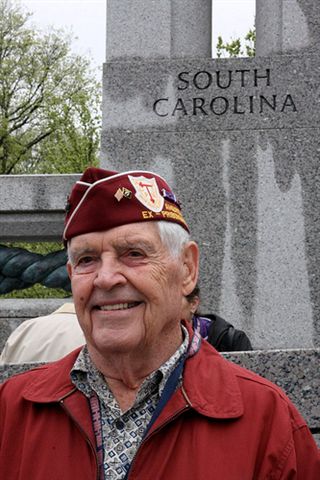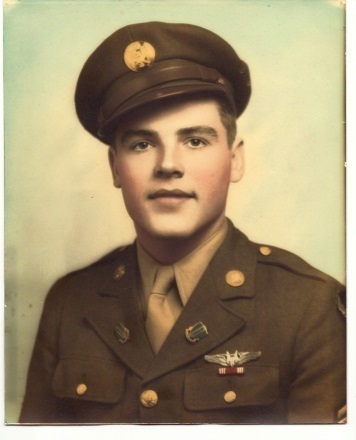
Hailing from South Carolina, Fowler enlisted in the Army Air Corps at age 18 during World War II and was assigned as a gunner on a B-24 Liberator bomber. Ultimately, the B-24 and its crew arrived in Italy and joined the 378th Bomb Squadron, 454th Bomb Group, at a time when the survival of 25 bombing missions earned Servicemembers a trip home.
On March 19, 1944, the fate of the 10-man crew changed forever as they took off on their 14th mission, to join 400 bombers bound to destroy enemy targets in Austria and defeat Nazi Germany’s Third Reich. For many of these Americans, it would be their final mission, as the enemy was waiting in the sky above.

Lou Fowler stands in front of the "South Carolina" pillar at the National World War II Memorial in Washington, D.C.
After the aircraft dropped their bombs, Fowler’s B-24 was hit by enemy flak, and enemy fighters pounced on the crippled aircraft. At 18,000 feet, the crew was ordered to bail out. Because parachutes were provided but not worn (due to bulky clothing needed to protect crews from the extreme cold temperatures at high altitude), gearing up took time. To Fowler’s shock, his parachute disappeared in an explosion, but his saving grace was that the parachute that had belonged to the belly gunner, who had been killed, still remained.
Although he was wounded, Fowler struggled to harness the parachute; then he was pitched out of the hole in the fuselage. Fowler and only two other crewmembers made it out of the dying aircraft. He soon lost consciousness.
When Fowler awakened, he was aided by locals and the next day joined a band of Yugoslav rebels who attempted to help him escape to the border. Sadly, the group was captured by German soldiers who immediately executed three of the others. Fowler was now a prisoner of war (POW).

Lou Fowler in uniform after he entered the Army Air Corps and before he deployed to combat operations in Europe.
Over the next several months, he was interrogated, transferred among prisoner-of-war camps, and forced to endure the misery of a cargo ship transporting POWs. He also survived Europe’s version of the brutal Bataan Death March.
On the evening of April 25, 1945, Fowler and two other POWs escaped their captors and were picked up by the U.S. Army.
After the war, Fowler returned to South Carolina and married Glennie McLaurin from Dillon in 1948. After 64 years of marriage, they have three children, seven grandchildren and six great-grandchildren.
Fowler went to school on the GI Bill after his discharge. He graduated from Presbyterian College in 1949, and went on to have a 40-year career with IBM as a sales representative. He now speaks to diverse groups about his experiences in hope that it educates people about the sacrifices of the greatest generation in World War II, inspires others to join or support the military, and motivates Veterans to seek out VA health care.
Fowler started receiving VA health care in 1945, and since 1999, he has been a patient at the William Jennings Bryan Dorn VA Medical Center in Columbia, S.C.

Former Dorn VAMC Interim Medical Center Director, Robert Hamilton, left, congratulates Lou Fowler after his discussion at the Lunch-n-Learn program for summer interns where the Veteran talked about his experience as a World War II airman and POW.
“I like VA health care for its high quality of total health treatment,” Fowler said.
He particularly likes “VA’s individual attention, professionalism in all departments and staff, its efficiency, the follow-through after appointments, and how the staff respect and show their concern for us.”
I learned three important things from this American patriot. First, keep the faith, despite even the most overwhelming odds. Second, have a purpose in life and work to fulfill that purpose. And third, love and serve our nation.
Louis Blanding Fowler—Veteran and American hero from South Carolina—has mastered these values; it was an honor to meet him.
Kevin Lee McIver is the Public Affairs Officer at the William Jennings Bryan Dorn VA Medical Center in Columbia, S.C. He is a 34 year Veteran of military and federal service. To read the full article with photographs visit the William Jennings Bryan Dorn VA Medical Center website.
Topics in this story
More Stories
The Social Security Administration is hoping to make applying for Supplemental Security Income (SSI) a whole lot easier, announcing it will start offering online, streamlined applications for some applicants.
Yusuf Henriques, an Army Veteran and former combat medic, is the founder and CEO of IndyGeneUS AI, a genomics company on a mission to improve health equity by increasing representation of women and racial minorities in clinical trials.
Online shopping scams are the riskiest scam for Veterans, with 77.3% of reports confirmed losing money when targeted by this scam.






